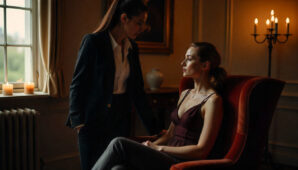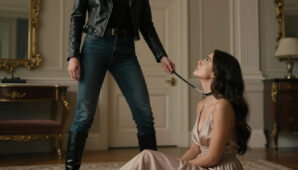
The Thief’s Misadventure
Mara moved like a shadow across the city skyline, her black catsuit blending with the night. The target: a sapphire pendant, its facets said to catch light like a trapped storm, locked in a glass case atop Victor Crane’s penthouse. She’d cased the place for weeks—high-tech security, a rotating guard schedule, and Crane himself, a collector with a reputation for oddity. Eccentric, they called him. Dangerous, whispered others. Mara didn’t care. She’d stolen from worse.
Scaling the building’s sleek exterior was child’s play—her grappling hook bit into the concrete ledge, and she vaulted over the balcony railing with feline grace. The penthouse sprawled before her, all glass and steel, a fortress of wealth. She bypassed the laser grid with a mirror trick, her breath steady, and there it was: the pendant, glowing faintly under its dome. She reached for it, tools poised—then a click. A net snapped up from the floor, tangling her legs and arms, hoisting her into the air. She twisted, cursing under her breath as the pendant mocked her from its perch.
Footsteps echoed, deliberate and unhurried. Victor Crane emerged from the shadows—tall, lean, his gray eyes glinting like polished steel beneath a mop of silver-streaked hair. He wore a tailored suit, midnight blue, and a smirk that cut deeper than any blade. “A thief?” he said, circling her dangling form. “How delightful.” His voice was smooth, edged with amusement, and Mara’s glare could’ve melted glass. She tugged at the net, but it held fast, her tools clattering to the floor below.
Crane didn’t call the police. Instead, he cut her down with a pocketknife, catching her as she stumbled, then half-carried, half-dragged her through a sliding panel into a hidden room. The space was a museum of the bizarre—taxidermied ravens perched on shelves, antique clocks ticking in discordant rhythm, a globe etched with forgotten continents. At the center stood a high-backed chair, its arms and legs fitted with leather straps, dark and worn. “Steal from me,” Crane said, easing her into it, “and you become mine—for a night.”
Mara’s pulse spiked, but her lockpicks were gone, her knife lost in the net. She bared her teeth, defiance her only weapon. “Try it, rich boy.” He chuckled, unfazed, and set to work. The leather straps slid over her wrists, cool against her skin, then her ankles, buckling with a practiced ease that suggested he’d done this before. Not tight enough to bruise, but firm—padded, even, as if comfort mattered to him. She tested them, muscles flexing, but they didn’t budge. “Comfortable?” he teased, stepping back to admire his handiwork.
She spat a retort, but Crane ignored it, pacing the room like a lecturer. “This raven,” he said, tapping a glass-eyed bird, “watched Napoleon fall. Stole a button from his coat.” He moved to a clock, its hands frozen at 3:17. “Stopped the night a duchess lost her head.” His stories wove a tapestry of theft and triumph, each artifact a trophy, and Mara—bound and seething—his latest exhibit. Yet his tone wasn’t cruel; it was conversational, as if she were a guest at some twisted dinner party.
The night stretched on, the city’s hum filtering through the walls. Mara’s anger cooled to calculation—watching his patterns, memorizing the room. Crane paused by a taxidermied fox, mid-tale, and caught her stare. “Plotting already?” he asked, amused. “Good. I’d be disappointed otherwise.” At dawn, he unbuckled the straps, his fingers brushing her wrist as he freed her. The pendant remained untouched in its case. “Next time, knock,” he said, tossing her a gold coin—old, heavy, etched with a grinning skull.
Mara snatched it midair and stalked out, her pride bruised but her curiosity ignited. The coin spun in her palm as she descended the fire escape, Crane’s smirk burned into her mind. She’d be back—not for the pendant, but for the game. He’d made it personal.











Leave Your Comment